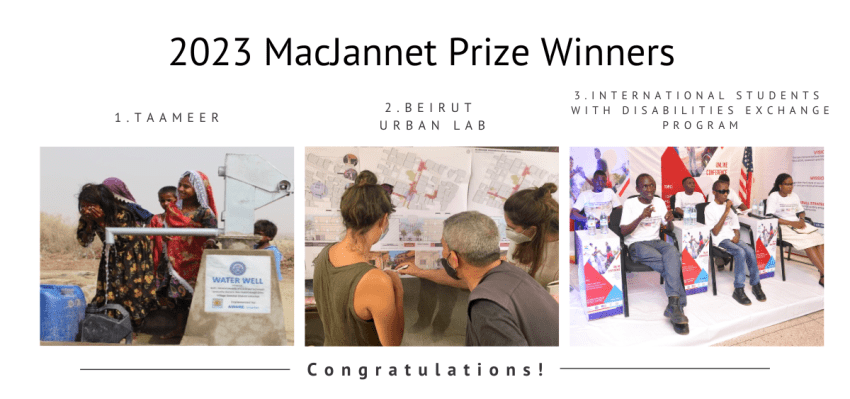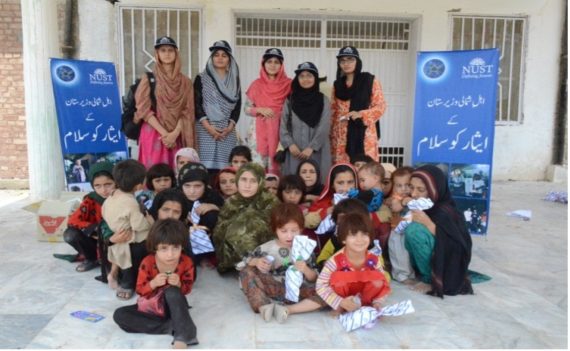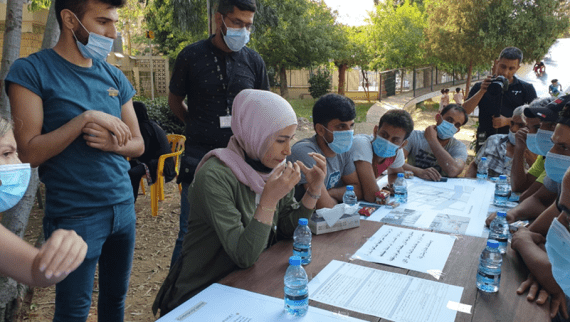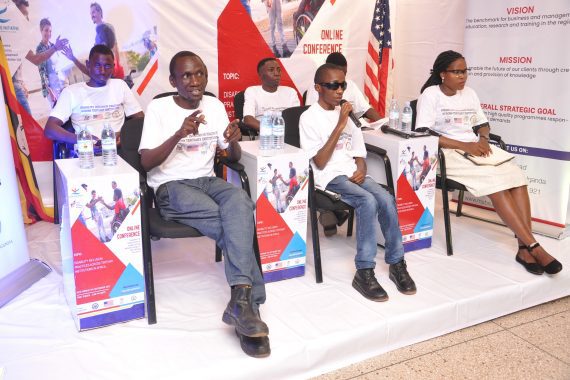2023 MacJannet Prize Winners


About the Winners:
First Place: Taameer, National University of Sciences and Technology (Pakistan)
 The NUST Community Services Club (NCSC) project Taameer is a flagship NCSC project that aspires to support relief, recovery, and rehabilitation during and after disasters like earthquakes, floods, and pandemics. It does this by providing immediate healthcare through medical camps; collecting and distributing ration bags, clothes, books, and stationery items; renovating and rebuilding impacted infrastructure like schools; installing water plants for clean water supply; strengthening disaster resilience and adaptive capacity; and creating awareness on climate change and disaster relief.
The NUST Community Services Club (NCSC) project Taameer is a flagship NCSC project that aspires to support relief, recovery, and rehabilitation during and after disasters like earthquakes, floods, and pandemics. It does this by providing immediate healthcare through medical camps; collecting and distributing ration bags, clothes, books, and stationery items; renovating and rebuilding impacted infrastructure like schools; installing water plants for clean water supply; strengthening disaster resilience and adaptive capacity; and creating awareness on climate change and disaster relief.
Taameer (Urdu word for “Build”) was established back in 2010 when devastating monsoon rains resulted in flood disaster in Pakistan. It was massive and unprecedented, killing more than 1,700 persons, affecting over 20 percent of the land area, more than 20 million people, and causing loss of billions of dollars through damages to infrastructure, housing, agriculture and livestock, and other family assets. The purpose of the project was to support immediate relief, recovery, and rehabilitation during and after disasters by providing healthcare through medical camps; collecting and distributing ration bags, clothes, books, and stationery items; renovating and rebuilding impacted infrastructure like schools; installing water plants for clean water supply; strengthening disaster resilience and adaptive capacity; and creating awareness on climate change and disaster relief.
Second Place: Beirut Urban Lab, American University of Beirut (Lebanon)
 The Beirut Urban lab is the Second Place winner of the MacJannet Prize. The lab is a research space based in the American University of Beirut. It brings together a hybrid team of researchers and practitioners working to address issues of urban transformations in the context of conflict, inequality and recovery. The aim of the lab is to adopt a spatial lens and deploy innovative research methodologies to help imagine co-produced and multidisciplinary modalities of planning and designing towards sustainable, equitable and inclusive cities which can respond to environmental challenges, as well as support the aspirations of residents and shed light on the precarities of urban dwelling. In a context where the Government of Lebanon selectively withdraws from public provision, the Lab, alongside a network of academics, activists and communities, seeks to understand and work with the variety of planning actors who operate at the policy level and/or intervene on the ground to inform governance processes. It also seeks to engage the wider public through an extensive set of openly accessible platforms with visualized data on multiple facets of the city and the built environment.
The Beirut Urban lab is the Second Place winner of the MacJannet Prize. The lab is a research space based in the American University of Beirut. It brings together a hybrid team of researchers and practitioners working to address issues of urban transformations in the context of conflict, inequality and recovery. The aim of the lab is to adopt a spatial lens and deploy innovative research methodologies to help imagine co-produced and multidisciplinary modalities of planning and designing towards sustainable, equitable and inclusive cities which can respond to environmental challenges, as well as support the aspirations of residents and shed light on the precarities of urban dwelling. In a context where the Government of Lebanon selectively withdraws from public provision, the Lab, alongside a network of academics, activists and communities, seeks to understand and work with the variety of planning actors who operate at the policy level and/or intervene on the ground to inform governance processes. It also seeks to engage the wider public through an extensive set of openly accessible platforms with visualized data on multiple facets of the city and the built environment.
The Beirut Urban Lab has had a profound influence on the way in which students view the complex social and economic factors that shape and transform urban spaces. In addition to contributing to the intellectual life of AUB graduate students, the Lab provides students with hands-on experience in urban research and policymaking. Through workshops, fieldwork, and collaborations with local organizations, overseas universities and research networks, students learn how to analyze urban environments, identify opportunities for improvement, and develop design and planning responses that are viable and relevant to the needs of different communities. Students also work in interdisciplinary teams and get to present their ideas to a range of audiences. This practical experience is invaluable for students who are interested in pursuing careers in urban planning, design, policy and related fields, and who want to challenge existing injustices and shift towards a more equitable urban society. By taking the urban realm as the focal point, the Lab has been able to work across disciplinary and sector-based divisions, to think with communities, local and national governments, and non-governmental groups, in order to learn about and inform the reshaping of the city.
Third Place: International Students with Disabilities Exchange Program, Makerere University (Uganda)

International Students with Disabilities Exchange Program is the third place winner of the 2023 MacJannet Prize. The program is based at the Disability Resource and Learning Center (DRLC), a Makerere University Business School outreach center that provides leadership for creating a proactive culture of disability awareness, facilitating the removal of barriers and creation of accessible and inclusive environments for students and staff with disabilities. This improves on the implementation of the UN Convention on the Rights of Persons with Disabilities (UNCRPD) and the Sustainable Development Goals (SDGs). The DRLC also offers consultation on a broad range of disability issues and carries out research on disability issues, employability and entrepreneurship among others and is a one stop point for disability information in Uganda.
One of the best strategies that has been used to build divergent capacities for students has been the aspect of networking. This takes shape from sharing unique experiences that are meant to empower different abilities that reside within these students or those that have not been explored. This originates from a school of thought that "everyone is blessed uniquely to pursue different goals in life." The International Students with Disabilities Exchange Program provides critical attention to the students that have been marginalized because of physical, mental, and auditory limitations. The MUBS Disability Resource and Learning Centre wishes to change the narrative from dismay to a ray of hope to empower students to achieve their dreams. This can be achieved through organizing exchanges that are tailored to tell the unique story of Disability across borders.
Honorable Mentions
Ecohuerta, Universidad Camilo José Cela (Spain), received honorable mention. The Organic Vegetable Garden, or Ecohuerta, was started in November 2020 with the aim of creating a sustainable community within Universidad Camilo José Cela. This entrepreneurial project, aligned with the 2030 Sustainable Development Goals, involves the creation of a vegetable garden under the principles of organic agriculture, maintained by an extended intergenerational and multidisciplinary community. It is a learning and collaborative work experience with a holistic approach, aimed at raising awareness of the benefits that organic farming and the circular economy bring to the health and well-being of people and the planet. Learn more.
Kindred Kinship (NK2): Kidney Care, National University of Medical Sciences (Pakistan) received honorable mention. The Kidney Care program promotes kindness, mental health, and combats social stigmas for patients impacted by kidney disease. It not only offers kidney disease patients treatment through coping techniques, but also raises awareness of renal disease among the general public. Moreover, it takes into account the welfare of healthcare workers, including medical staff so as to enhance their efficiency. Learn more.
Proyecto COLABORAR (Project COLLABORATE), Pontificia Universidad Católica de Chile (Chile) received honorable mention. The mission of Proyecto COLABORAR is to strengthen the community in the territory of La Legua (San Joaquín) for the prevention of violence. Through alliances with local organizations, the project aims to promote opportunities for meaningful and experiential learning (such as service-learning), where students can develop public commitment, critical thinking, ethical professional reflection, problem-solving skills, and collaborative work. Learn more.
The Talloires Network would like to recognize the impactful work of all of the finalists for the 2023 MacJannet Prize and we thank all of the nominees. We would also like to thank the 8 civic engagement leaders from 7 countries who were part of the international selection committee.
International Section Committee:
Nathaniel Halsey, MacJannet Foundation Trustee
Alexis Rudisill, MacJannet Foundation Trustee
Eva Cano Fernandez, Universidad Camilo José Cela (Spain)
Harunah Damba, Makerere University (Uganda)
Diana Jimena Ordoñez Castillo, Universidad de los Andes (Colombia)
Martina Jordaan, University of Pretoria (South Africa)
Nurzhamal Karamoldoeva, American University of Central Asia (Kyrgyzstan)
Frances Ridout, Queen Mary University of London (United Kingdom)